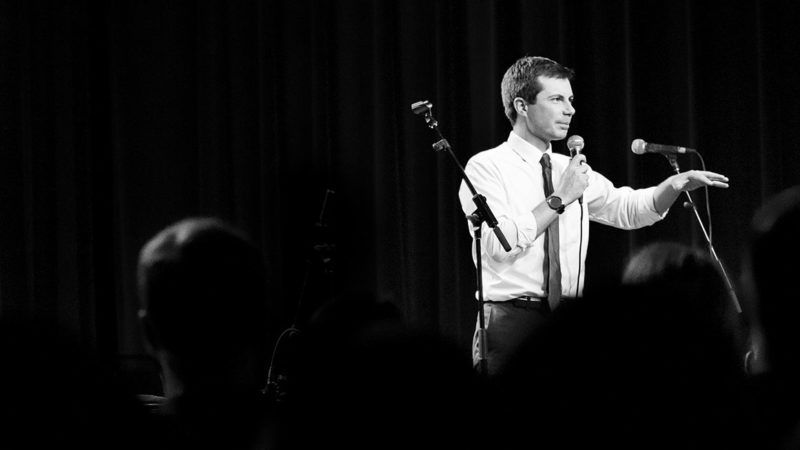Mayor Pete's 'National Service' Plan Was a Nationalist Fantasy
Buttigieg doesn't realize that using the blunt force of government to forge national unity will forever disappoint.

Pete Buttigieg, the former mayor of South Bend, Indiana, who briefly looked like a serious contender for the Democratic presidential nomination before dropping out on March 1, loves imagining his war-veteran self on a debate stage with the Vietnam-dodging Donald Trump. He is also fond of asserting that "few—if any—single policy solutions carry the promise of democratic renewal more than national service."
What Buttigieg and other fans of the perennially elusive goal of national service fail to grasp is that the real-world anecdote always undermines the campaign-season fantasy. Using the blunt force of government to forge national unity will forever disappoint as long as individuals have the ability to wiggle out of conformity.
Nodding to the political realities of the day, Mayor Pete stresses that his plan is "strictly optional." But it's worth remembering that no U.S. resident can legally opt out of paying the taxes that feed the federal beast.
The 2009 Edward M. Kennedy Serve America Act (if you wince at that title, note that the House version was called the Generations Invigorating Volunteerism and Education, or GIVE, Act) expanded the upper limit on Bill Clinton's AmeriCorps from 75,000 annual volunteers to 250,000, ostensibly paid for by jacking up the annual appropriation to just over $1 billion. Yet Buttigieg notes that current funding levels translate into acceptance for only 13 percent of AmeriCorps applicants and 25 percent of Peace Corps aspirants.
The mayor doesn't put a price tag on his "Service for All (who want it)" plan, nor does he acknowledge that—like the military, whose acceptance levels are only 20 percent, despite U.S. foreign policy's inexhaustible appetite for young bodies—many people who "want" to join fail to meet the minimum qualifications. Still, his idea seems undoable at less than $5 billion a year.
Which, to be sure, is only as much as Washington spends each morning. But when not dreaming out loud about priceless plans like this one, Buttigieg was one of the few candidates who actively campaigned on reducing the government's unconscionable trillion-dollar deficits.
And don't kid yourself—Buttigieg would love for national service to be a hell of a lot more expensive than $5 billion a year. Asked by MSNBC's Rachel Maddow in April 2019 why he chose to enlist in his mid-20s after Harvard and Oxford, the candidate waxed eloquently about seeking to bridge the country's vast class and racial divides, a gap perhaps most starkly observed in who does and does not serve in the military.
"One thing we could do that would change that," he told Maddow, "would be to make it, if not legally obligatory, but certainly a social norm, that anybody after they're 18 spends a year in national service." On his website, the candidate reiterates that aspiration: "Our intention is for this proposal to create a pathway towards a universal, national expectation of service for all 4 million high school graduates every year."
Beware politicians touting blanket expectations for 18-year-olds. That kind of generational puppeteering is why we still have such illiberal anachronisms as Selective Service, such punitive paternalisms as our brand new national vaping ban for those under 21, and such questionable national trends as the over-preference for college educations over workplace apprenticeships and vocational training.
Buttigieg's proposal is nearly identical to one coughed up by then–Sen. John McCain in the pages of the Washington Monthly after September 11, 2001. "The decline of the citizen-soldier is not healthy for a democracy," McCain wrote. "While it is not currently politically practical to revive the draft, it is important to find better incentives and opportunities for more young Americans to choose service in the military, if not for a career, then at least for a limited period of time."
Banging the social-cohesion drum, too, was McCain's 2008 vanquisher, Barack Obama, who on the campaign trail touted a national volunteer network "just as powerful, just as strong, just as well-funded" as the military.
The problem is not that some Americans choose to serve in the armed forces or AmeriCorps. The problem is that by conscripting taxpayer money toward those purposes, politicians are distorting the marketplace of 18-year-olds' choices and empowering themselves to decide what meaningful service looks like.
I am glad Mayor Pete served, and I am glad that I did not. May our children have even more choices than we did.


Show Comments (23)